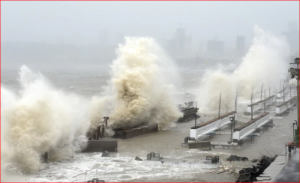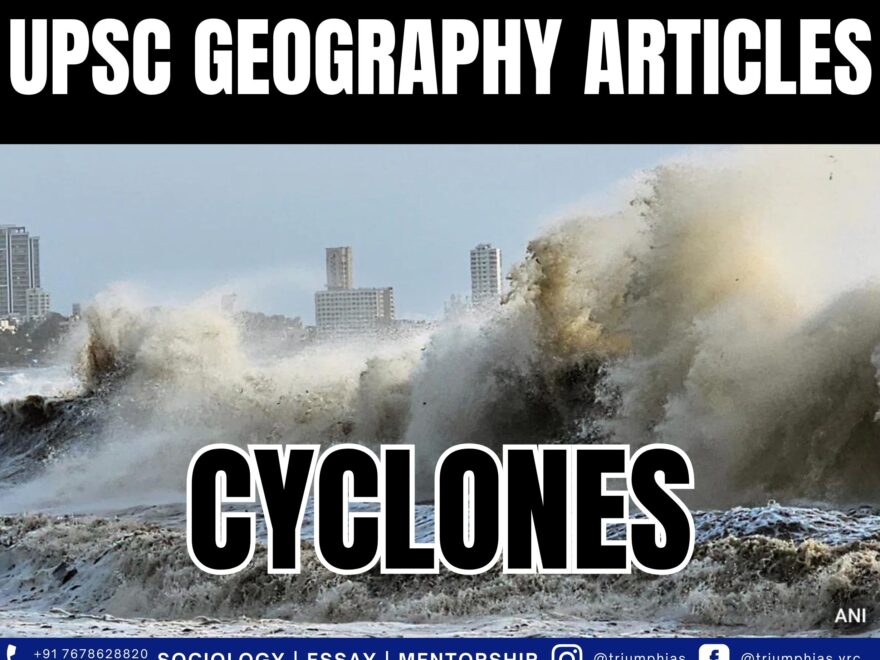Cyclones
(Relevant for Geography section of General Studies Paper Prelims/Mains)

Cyclones involve swift inward air movement encircling a region of low pressure. In the Northern hemisphere, the airflow follows a counterclockwise path, while in the Southern hemisphere, it adopts a clockwise course.
Typically, cyclones are accompanied by intense storms and adverse weather conditions.
The term “Cyclone” originates from the Greek word “Cyclos,” signifying the coils of a serpent. This term was introduced by Henry Peddington, inspired by the resemblance of tropical storms in the Bay of Bengal and the Arabian Sea to coiled sea serpents.
Types of cyclones
There exist two categories of cyclones:
- Tropical cyclones
- Extra Tropical cyclones (also referred to as Temperate cyclones, middle latitude cyclones, Frontal cyclones, or Wave Cyclones).
- The term ‘Tropical Cyclone’ is utilized by the World Meteorological Organisation to encompass weather systems characterized by winds surpassing ‘Gale Force’ (a minimum of 63 km per hour).
- Tropical cyclones emerge within the zone between the Tropics of Capricorn and Cancer. These are extensive weather systems originating over tropical or subtropical waters, where they organize into surface wind patterns.
- Meanwhile, extra tropical cyclones manifest in temperate regions and high latitude areas, although their source can be traced back to the Polar Regions.
Tropical cyclones
Tropical cyclones are fierce storms originating over oceans in tropical regions, subsequently advancing towards coastal areas and inflicting significant devastation due to their violent winds, heavy rainfall, and storm surges.
Tropical Cyclones stand as one of the most catastrophic natural disasters globally.
Tropical cyclones come into existence and gain strength over warm tropical oceans. The conditions conducive to their formation and intensification are as follows:
- Extensive ocean surface with temperatures surpassing 27°C.
- Presence of the Coriolis force.
- Minimal fluctuations in vertical wind speed.
- A pre-existing weak low-pressure zone or low-level cyclonic circulation.
- Upper divergence over the sea-level system.
Stages of Tropical Cyclone Formation: The life cycle of tropical cyclones can be segmented into three stages:
- Formation and Initial Development Stage: The birth and preliminary growth of a cyclonic storm hinge on the transfer of heat and water vapor from the warm ocean to the air above, primarily through ocean surface evaporation. This process leads to the creation of towering vertical cumulus clouds as warm air ascends, condensing above the ocean surface.
- Mature Stage: As a tropical storm strengthens, air ascends vigorously in thunderstorms, spreading out horizontally at the tropopause level. This horizontal expansion generates positive pressure at higher levels, driving descending air through convection. Due to this subsidence, the air warms up through compression, forming a warm ‘Eye’ (low-pressure center). In the Indian Ocean, a mature tropical cyclone exhibits a concentric arrangement of turbulent cumulus thundercloud bands.
- Modification and Decay: A tropical cyclone initiates its weakening process in terms of central low pressure, internal warmth, and high speeds as its supply of warm, moist air diminishes or is abruptly halted. This decrease occurs post-landfall or upon traversing cold waters.
Extra Tropical cyclones
Extratropical cyclones are known by various names, including mid-latitude depressions, temperate cyclones, frontal depressions, and wave cyclones.
These cyclones are active in the mid-latitudinal regions, spanning between 35° and 65° latitude in both the Northern and Southern Hemispheres. Their movement predominantly occurs from west to east, particularly during the winter seasons. Within these latitude bands, the convergence of polar and tropical air masses takes place, resulting in the formation of fronts.
Formation of Extratropical Cyclones:
- The emergence and progression of temperate cyclones find their most suitable explanation in the Polar Front theory.
- According to this theory, humid and warm air masses from the tropics converge with cold and dry air masses from the polar regions, resulting in the creation of a polar front.
- The denser and heavier cold air mass causes the warmer air mass to be lifted upwards.
- This interaction between the cold and warm air masses induces instability, leading to the development of low pressure at the intersection point, especially at its central region.
- This scenario results in the formation of a void due to the reduction in pressure. The surrounding air rushes in to fill this void, and when combined with the Earth’s rotation, a cyclone takes shape.
- Extratropical cyclones stand in contrast to the more intense cyclones or hurricanes in the tropics, which materialize in areas with relatively consistent temperatures.
To master these intricacies and fare well in the Sociology Optional Syllabus, aspiring sociologists might benefit from guidance by the Best Sociology Optional Teacher and participation in the Best Sociology Optional Coaching. These avenues provide comprehensive assistance, ensuring a solid understanding of sociology’s diverse methodologies and techniques.
Cyclones, tropical cyclones, extratropical cyclones, formation, weather phenomena, storm surges, disaster, meteorology, cyclone types, impact, weather patterns, tropical storms, extratropical storms, Cyclones, tropical cyclones, extratropical cyclones, formation, weather phenomena, storm surges, disaster, meteorology, cyclone types, impact, weather patterns, tropical storms, extratropical storms, Best Sociology Optional Coaching, Sociology Optional Syllabus.

Choose The Best Sociology Optional Teacher for IAS Preparation?
At the beginning of the journey for Civil Services Examination preparation, many students face a pivotal decision – selecting their optional subject. Questions such as “which optional subject is the best?” and “which optional subject is the most scoring?” frequently come to mind. Choosing the right optional subject, like choosing the best sociology optional teacher, is a subjective yet vital step that requires a thoughtful decision based on facts. A misstep in this crucial decision can indeed prove disastrous.
Ever since the exam pattern was revamped in 2013, the UPSC has eliminated the need for a second optional subject. Now, candidates have to choose only one optional subject for the UPSC Mains, which has two papers of 250 marks each. One of the compelling choices for many has been the sociology optional. However, it’s strongly advised to decide on your optional subject for mains well ahead of time to get sufficient time to complete the syllabus. After all, most students score similarly in General Studies Papers; it’s the score in the optional subject & essay that contributes significantly to the final selection.
“A sound strategy does not rely solely on the popular
Opinion of toppers or famous YouTubers cum teachers.”
It requires understanding one’s ability, interest, and the relevance of the subject, not just for the exam but also for life in general. Hence, when selecting the best sociology teacher, one must consider the usefulness of sociology optional coaching in General Studies, Essay, and Personality Test.
The choice of the optional subject should be based on objective criteria, such as the nature, scope, and size of the syllabus, uniformity and stability in the question pattern, relevance of the syllabic content in daily life in society, and the availability of study material and guidance. For example, choosing the best sociology optional coaching can ensure access to top-quality study materials and experienced teachers. Always remember, the approach of the UPSC optional subject differs from your academic studies of subjects. Therefore, before settling for sociology optional, you need to analyze the syllabus, previous years’ pattern, subject requirements (be it ideal, visionary, numerical, conceptual theoretical), and your comfort level with the subject.
This decision marks a critical point in your UPSC – CSE journey, potentially determining your success in a career in IAS/Civil Services. Therefore, it’s crucial to choose wisely, whether it’s the optional subject or the best sociology optional teacher. Always base your decision on accurate facts, and never let your emotional biases guide your choices. After all, the search for the best sociology optional coaching is about finding the perfect fit for your unique academic needs and aspirations.
To master these intricacies and fare well in the Sociology Optional Syllabus, aspiring sociologists might benefit from guidance by the Best Sociology Optional Teacher and participation in the Best Sociology Optional Coaching. These avenues provide comprehensive assistance, ensuring a solid understanding of sociology’s diverse methodologies and techniques. Sociology, Social theory, Best Sociology Optional Teacher, Best Sociology Optional Coaching, Sociology Optional Syllabus.
Best Sociology Optional Teacher, Sociology Syllabus, Sociology Optional, Sociology Optional Coaching, Best Sociology Optional Coaching, Best Sociology Teacher, Sociology Course, Sociology Teacher, Sociology Foundation, Sociology Foundation Course, Sociology Optional UPSC, Sociology for IAS,
Follow us :
🔎 https://www.instagram.com/triumphias
🔎https://www.youtube.com/c/TriumphIAS
https://t.me/VikashRanjanSociology
Find More Blogs
|
Scope of the subject and comparison with other social sciences |
|||
|
|
|
|
Modernity and social changes in Europe |

